In Government, ‘Failure Is Just an Opportunity to Learn’
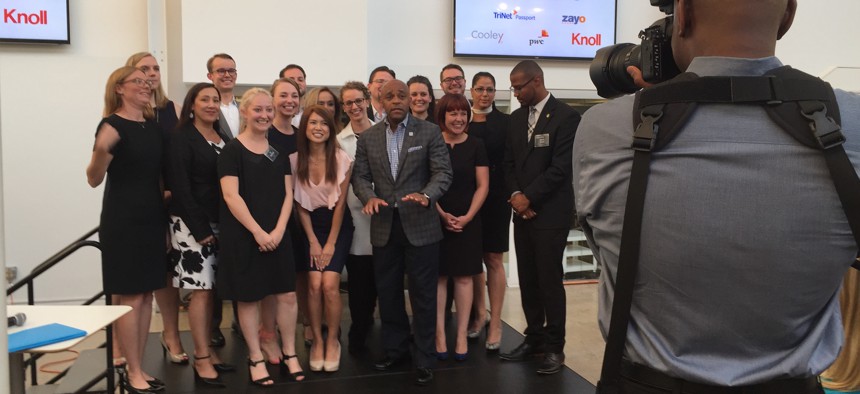
The pitch teams with Denver Mayor Michael Hancock John Tomasic

Connecting state and local government leaders
Public policy makers in Colorado consider a second round of pathbreaking entrepreneurial-style problem-solving pitches.
DENVER — Last Thursday was pitch night for the Government Entrepreneurial Leadership Accelerator program. It was a buzzing culmination of weeks of workshops, think sessions, team building exercises, consultations with experts and fact-finding missions.
Four teams of four people each took the stage at the Galvanize Inc.’s co-work space in downtown Denver’s Golden Triangle area to pitch new approaches to vexing public policy issues. Each team included University of Colorado law students paired with state and local government employees in Colorado—each of whom was granted a nine-week leave from their jobs to participate in the program.
GELA (“g-ee-lah”), as the program is often called, is a joint project launched in 2016 by the City and County of Denver working with the Silicon Flatirons Center for Law, Technology and Entrepreneurship at the University of Colorado Boulder, which is located beside the iconic Flatiron Rocky Mountain foothills. The aim of the program is to fuel the kind of innovation in government that famously has marked tech-industry startup culture over the last three decades.
Indeed, startup language pervades the project.
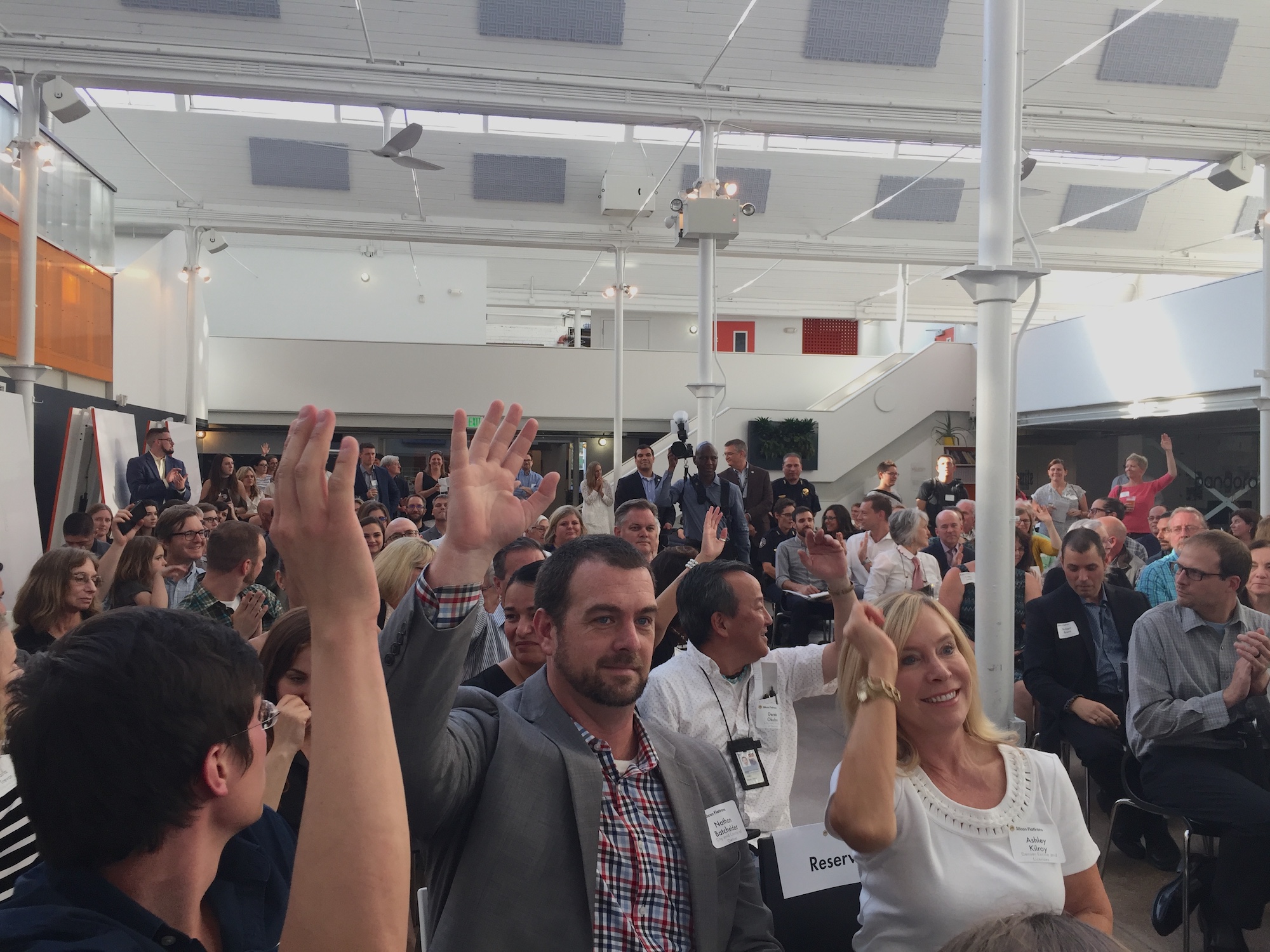
“Failure is not a dirty word,” said Phil Weiser, former University of Colorado Law School Dean who is also founder of Silicon Flatirons and its executive director. “You don’t hear it much in government, and for some good reasons—city staffers don’t want to make it into the news, right?—but failure is just an opportunity to learn. The only mistake is to not experiment.”
Weiser speaks at a rapid clip about things like “core values” and “network thinking” and a “mentor-driven culture” that “gives first.”
“In startup business, you iterate,” he said. “A project evolves. You do rounds. That’s very much the mindset we’re trying to foster. You try something. You learn from it. You do it again differently. You iterate.”
Pitch night is a perfect showcase for the project.
The Galvanize Golden Triangle “campus” is the first of eight Galvanize “incubator” spaces opened over the last five years in cities that include Austin, Boulder, New York, San Francisco and Seattle. The Golden Triangle campus is a former industrial space with an open floor plan, marked-up whiteboards, shared bookshelves, exposed brick walls, an interior garage door and an in-house cafe and bar. It’s a setting meant to host a different kind of public policy meeting—a message not lost Thursday on the pitch night attendees. The place was filled with government employees, but you could count the number of neckties in the room on one hand.
This year, the accelerator groups proposed plans to better serve the shelter needs of Denver’s homeless population; reduce the isolation that plagues the city’s expanding elderly population; fuel the local food truck industry, in part by making health inspection more efficient; and more effectively address the crisis of opioid overdose at Denver’s Central Library.
The teams are meant to bring fresh eyes to the issues and to dive into group research. They’re also meant to lean on the guidance of appointed area-expert mentors and sponsors, which this year included public- and private-sector attorneys, human rights advocates, and housing and public health and environment officials.
The program begins with three weeks of “bootcamp” instruction on business-management-type topics, such as team building, interest-based problem solving, the entrepreneurial mindset, data analytics and visualization and problem-statement mapping.
Then comes three weeks of drilling down into their topics and formulating a pitches.
That’s followed by another three weeks of refining their pitches and writing up a plan of action for local government offices to review and take up.
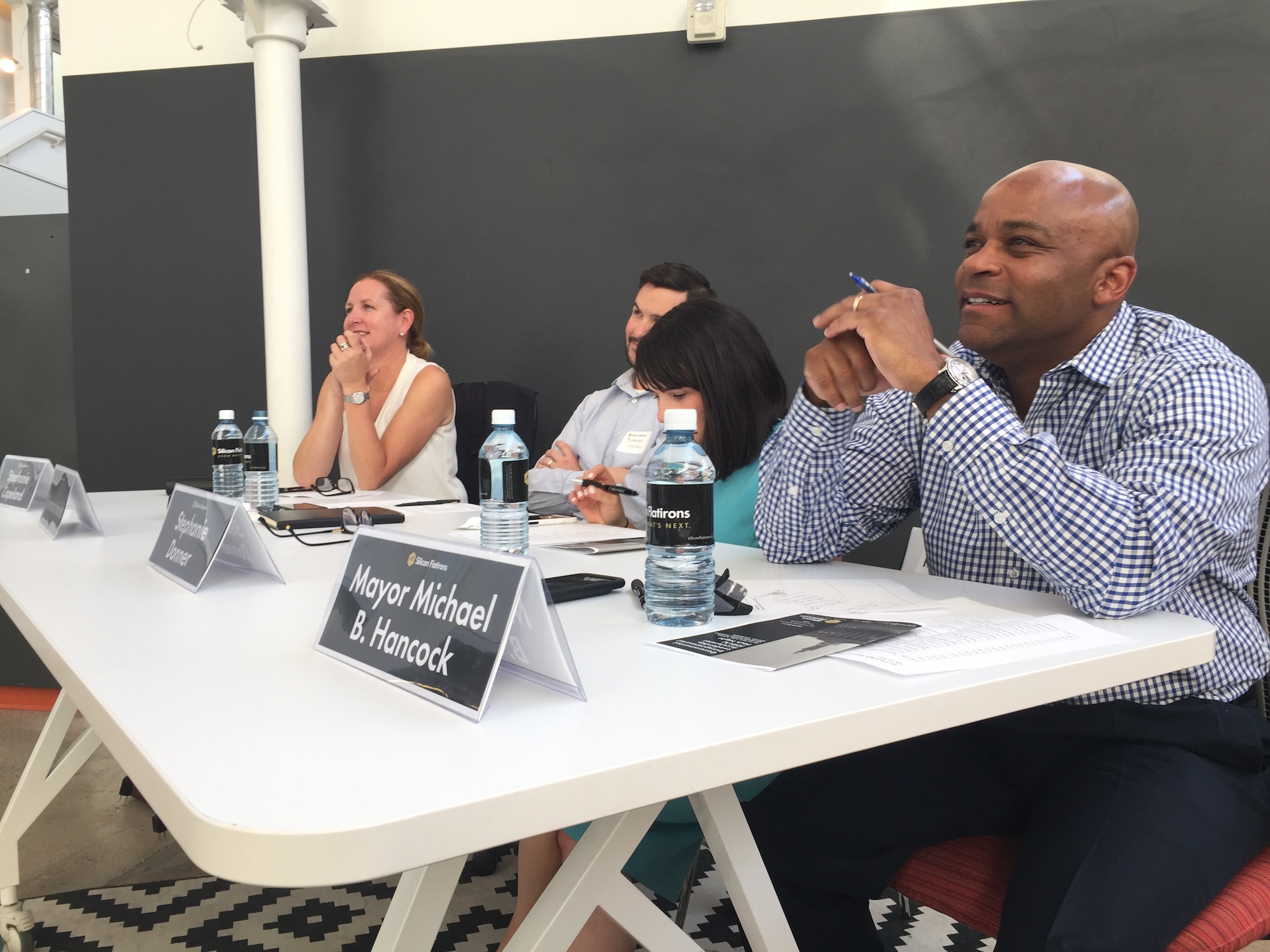
“The [GELA] program made a lot of sense for us because it just resonates with the value we have on our team for collaboration, [the value] in using data and evidence to really address the issues we face and to innovate and to look elsewhere, to look to the private sector and say ‘What solutions can we try—maybe they’ll work, maybe they won’t—but let’s give them a try and see what we can do and see if we can make things happen,’” David Padrino, Colorado’s deputy chief operating officer, told the Pitch Night crowd.
“The other part of this that’s so meaningful to us and the culture we try to promote is about investing in people,” Padrino said. “The folks here took time off from their jobs to focus, to go deep into a bootcamp, to really learn how they could apply different skills and techniques to these problems. It’s not the kind of thing you usually see in the public sector, but it’s the kind of thing that this program is trying to promote—this mayor, this governor—that this team is trying to push forward.”
The teams each wrapped up their pitches in under ten minutes and then fielded questions asked by a panel of four judges, which included Denver Mayor Michael Hancock and Stephanie Copeland, Colorado’s executive director of economic development and international trade. Team members passed microphones back and forth smoothly. Some told jokes. Some role played, bringing the story of an addict or a homeless person to life. All of the teams presented memorable snippets of data related to their topics and meant to drive points home. TED Talk-style slide shows scrolled on screens behind them.
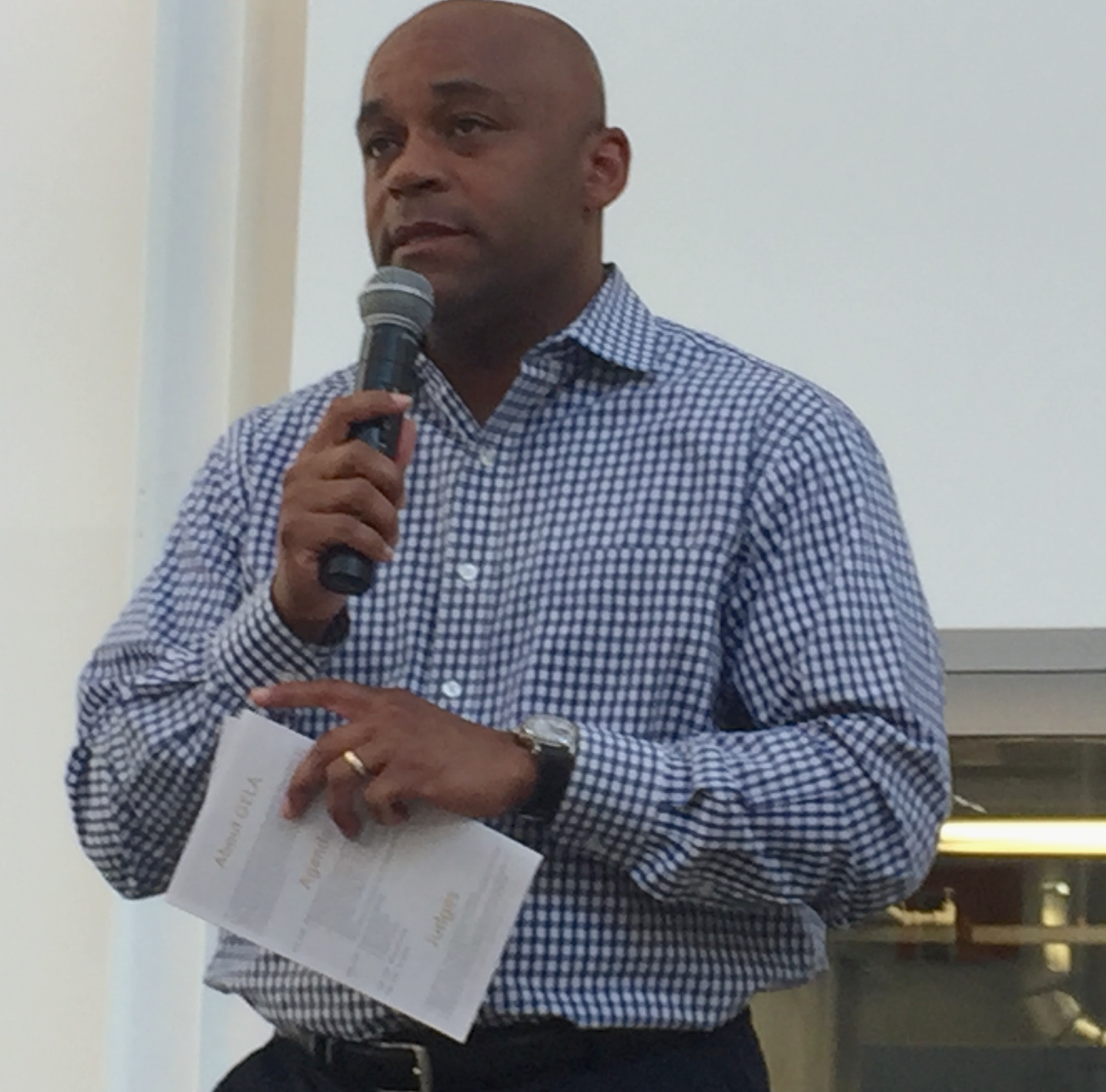
“Team Homeless” proposed reworking key shelters in Denver at relatively low cost to provide more of the kind of services—storage, counseling, pet care—proven in other cities to attract homeless residents currently reluctant to use public services.
“Team Aging” proposed equipping a van with medical and communication technology that staff would drive to the places where elderly residents live. “Social isolation has a similar effect and impact on health outcomes as smoking 15 cigarettes a day or drinking six alcoholic drinks. It’s twice as dangerous as obesity,” said team member James Leeper. The Denver van visits would battle a general reluctance on the part of elderly residents to get out in part by acting as small local social events. The goal would be to connect residents with their neighbors while providing vital services and information.
“Team Opioid Epidemic” proposed reallocating existing resources and personnel to the small geographic area around the Central Library to achieve the most bang for the buck. They proposed the city dedicate to the library a small team of staffers that would include substance abuse and mental health navigators and one specialized police officer trained in addiction and overdose who would be able to work better with the greater library community on what’s a tough public health challenge.
“Team Mobile Vendors” pitched an app that would track vendors and publicly map their locations in the city around the clock. The app would free Denver’s lean health inspections staff from wasting time trying to track down trucks to inspect. The city would also promote the app with the public so it could act as a marketing platform for truck operators. “It’s Taco Tuesday, Denver! Come out for breakfast in Capitol Hill, lunch in LoDo, happy hour in Highlands!”
Questions from the judges mostly focused on cost estimates and success metrics. Judges suggested tweaks to each of the proposals.
Participants in the program said that the willingness of city, county and state leaders to invest nine-weeks of staff time in the GELA program speaks to a dedication to the entrepreneurial approach and what they characterized as a rare culture of openness and creativity on the part of Colorado government.
“We’re benefiting here from a 20-plus-year journey in Denver-Boulder,” Weiser said. He pointed to the willingness of local entrepreneurial leaders to participate in the program and help shape it as it evolves—leaders from groups such as Techstars, the Unreasonable Institute and MergeLane that began to put down roots in the region beginning in the late 1990s.
“So we have a community of proven entrepreneurs and in government we have a mindset and leadership that is open and enthusiastic about that culture,” Weiser said. “Those two conditions are key to success.”
Ultimately, the government accelerator program is intended to work as a model for public policy development around the country.
On that score, Weiser added that the real lesson of the program is that “entrepreneurial talent needs to be made available for governments to tap everywhere.”
“It’s going to be more difficult in some areas of the country, but it’s doable,” he said. “Local governments with local universities can bring in talent and support an entrepreneurial ecosystem. I tell any community, ‘Take the long view!’”
He was echoing a theme that ran through pitch night.
“A major aspect of the program is cultural,” he said. “Maybe a team’s project doesn’t gain traction for whatever reason, but the experience of working on the team and thinking differently about how to approach public policy, how to work with colleagues, where to look for answers… Maybe that person’s professional life has been transformed through the experience, their whole approach to what they do, and maybe the change will bear fruit in other projects.”
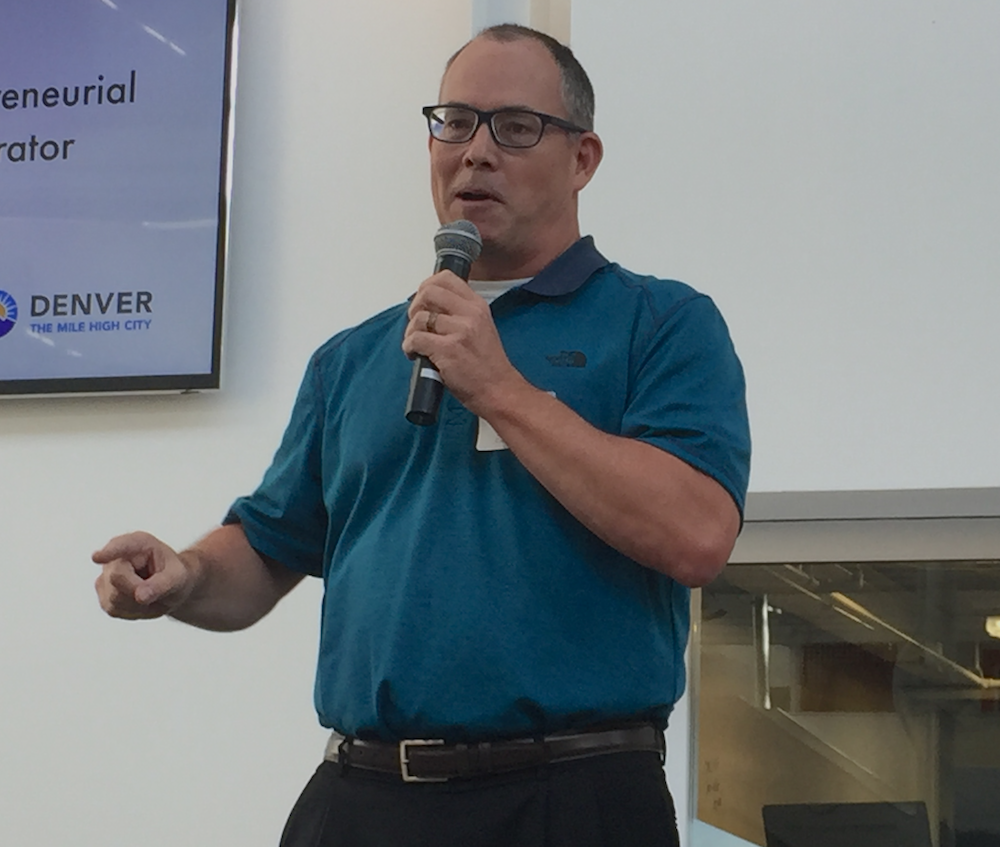
David Edinger, chief performance officer for the City and County of Denver, said he thought the program was already yielding tangible benefits for the public, state and local governments and individual government employees.
He said that the public employees the program draws to participate tend to get noticed and promoted, and he mentioned that a plan drawn up last year by program participants already had significantly improved broadband access for city students.
“These groups are looking at the kind of problems that are serious and persistent and that cross agencies but that nobody is paying attention to in a similarly persistent and focused way,” he said.
Weiser said this year’s program has benefitted from the experience of last year’s program. As he put it, the program has already “iterated.”
Last year, the government participants were strictly from Denver City and County offices. This year the program directors confidently incorporated state government offices as well.
The curriculum this year also placed greater emphasis on team building and team dynamics. Weiser said the quality of the teams was even more crucial to the success of the proposals than the directors anticipated. “We had to think harder and be more purposeful,” he said, about working to strengthen that aspect of the training—through intense boot camp sessions, for instance, dedicated specifically to the topic.
John Tomasic is a journalist who lives in Boulder, Colorado.

NEXT STORY: The Tech That Helps San Francisco Process Its Wastewater


